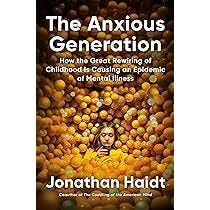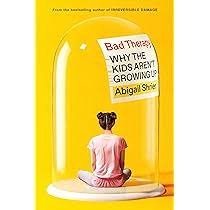Diary of the Late Republic, #4
There are some books—you know the type—where you hear so much about them (reviews, interviews, podcasts) that you feel like you know them without actually having to read them. Jonathan Haidt's The Anxious Generation: How the Great Rewiring of Childhood Is Causing an Epidemic of Mental Illness is one such study. The argument is fairly straightforward: as a society, we have paid far too much attention to protecting kids from the dangers of real life (what he and Greg Lukianoff dubbed “safetyism” in their last book The Coddling of the American Mind) and far too little attention to the way social media is damaging their minds and souls. I think a lot of us are willing to believe that without reading a 300-page book. What you actually get from reading it, though, is the sheer solidity of Haidt's argument, which fuses empirical research with religious and spiritual perspectives (he himself is an atheist). Step by step, he both documents the slide in mental health among young men and women—as well as the differences in the way it plays out—and systematically demolishes any series of possible explanations for these phenomena other than the proliferation of smartphones after 2012.
No argument is impregnable, and I imagine that with the passage of time chinks will emerge that subsequent analysts will widen, because that's the way social science works. (It's also the way history works: ideas get dated, reconfigured, forgotten, and resurrected.) But The Anxious Generation is a tour de force work of accessible scholarship that will prove durable both as an argument and as a document of the moment in which we're living. (I still think Haidt’s The Righteous Mind: How Good People Are Divided by Politics and Religion remains his most durable and satisfying work.)
As you're also probably aware, there's another new book that's emerged as a kind of companion piece for Haidt's: Abigail Shrier's Bad Therapy: Why the Kids Aren’t Growing Up. Shrier is the author of Irreversible Damage: The Transgender Craze Seducing Our Daughters, a book that was subject to a series of banning campaigns (Amazon.com, which sold the book despite protests by employees, refused to accept advertising for it.) Like The Anxious Generation, Bad Therapy has an easily graspable argument, which is that the professional therapeutic infrastructure of the United States has crippled parental authority and confidence in child-raising—and in the name of misguided compassion, is undermining the resilience of adolescents. Shrier is more heavy-handed than Haidt, and her argument rests more on anecdote (with an occasional dollop of sarcasm) than he does. But there’s a hard kernel of common sense in her position that I suspect will be the leading edge of a pendulum swing in the conventional wisdom when it comes to dealing with kids—especially among educators. All the ones I know, an admittedly small sample, have become exasperated by the degree of coddling that is often a matter of official school policy.
Still, after reading these books, I had to remind myself that most kids I see today are reasonably well-functioning people. They read less, and have more trouble focusing, to be sure. But clinical depression and anxiety remain the exception rather than the rule. And as exasperating, even troubling, as social media may be, there is a long tradition of oldster hand-wringing over novels, movies, comic books, television, and musical genres such as jazz, rock & roll, and hip-hop. (To his credit, Haidt recognizes this, but maintains that the sheer omnipresence of social media through smartphones puts this latest medium and its cultural conventions in a different category.) When I was in college, I read psychoanalyst Rollo May’s classic 1950 study The Meaning of Anxiety, which was one of the first studies of that clinical condition at the time. A big part of the reason for that was the dawn of the nuclear age. Our dread is more diffuse, but perhaps no less powerful.
I find myself wondering if this problem is going to take care of itself: a day will come when the press of events, whether economic, political, or environmental, will force us to focus on existential questions of survival rather than fretting why we’re not thriving. Not exactly something I’m looking forward to. But a reminder that social problems are relative.





For some reason, this piece reminded me of an old Woody Allen joke.
Allen tells a friend that his brother is suffering from a strange psychiatric condition. He thinks he's a chicken. He walks like a chicken, clucks like a chicken, darts his head to and fro like chicken.
Woody asks if the family has sought professional help for his brother. Woody responds "We would like to but, frankly, we need the eggs". I stopped telling that joke 30 years ago because more than a few people had no clue as to why that is funny. Maybe it's not.
University administrators at our most prestigious colleges treat students as trauma victims. No offense is trivial, they are all capital. College Presidents may know that they have student populations thick with young adults who have poorly developed inner resources and could use training in finding perspective in controversy. But that is no longer central to the Mission. There is a weak applicant pool for that kind of school (U of Chicago being the exception). And colleges need the eggs.